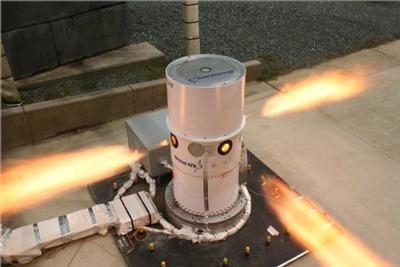Wed, May 03, 2017
Test Demonstrates Attitude Control Motor Design Meets Human-Rated Requirements
Another milestone has been reached in the development of the Attitude Control Motor (ACM) for NASA’s Orion spacecraft Launch Abort System (LAS). Members of the NASA and Lockheed Martin team were on hand to witness the successful ACM test conducted by Orbital ATK, which demonstrated the motor’s power to steer the LAS during a mission-abort scenario.

This recent test is part of a design, analysis and test series focused on qualifying the ACM for crewed-flight missions. Initial data from the test show the motor is very capable of fulfilling its critical role in the Launch Abort System.
“With the Orion spacecraft and Space Launch System, NASA has taken up the challenge of not just opening up space exploration, but making it as safe as possible for our astronauts,” said Pat Nolan, Vice President and General Manager of the Missile Products Division of Orbital ATK’s Defense Systems Group. “Orbital ATK is proud to support that vision with our innovative and reliable technology. The success of today’s test brings us that much closer to seeing this vision realized.”
Orbital ATK has been working with Lockheed Martin and NASA to leverage the company’s extensive advanced propulsion and controls capabilities deployed in other mission critical applications to provide steering thrust that can be reliably operated in an instant as part of the Orion crew-escape system. Orbital ATK also produces the main Launch Abort motor, providing the necessary thrust to pull the crew module safely away from the vehicle. These items have been in development for many years, and will be ready to support the first Space Launch System flight late next year.
The Orion spacecraft is launched by NASA's Space Launch System and built to take humans farther into space than they've ever been. Lockheed Martin is leading the industry team charged with developing Orion under contract to NASA. Orbital ATK’s Attitude Control Motor uses a solid propellant gas generator with eight proportional valves to steer the LAS in the event of a mission-abort scenario.
(Image provided with Orbital ATK news release)
More News
Aero Linx: Model Aeronautical Association of Australia MAAA clubs are about fun flying, camaraderie and community. For over 75 years, the MAAA has been Australia’s largest fl>[...]
Touchdown Zone Lighting Two rows of transverse light bars located symmetrically about the runway centerline normally at 100 foot intervals. The basic system extends 3,000 feet alon>[...]
“Discovery and innovation are central to our mission at Virgin Galactic. We’re excited to build on our successful record of facilitating scientific experiments in subor>[...]
How To Get A Story On Aero-TV News/Feature Programming How do I submit a story idea or lead to Aero-TV? If you would like to submit a story idea or lead, please contact Jim Campbel>[...]
Student Pilot Reported That During Rotation, “All Of A Sudden The Back Of The Plane Kicked To The Right..." Analysis: The student pilot reported that during rotation, “>[...]
 ANN's Daily Aero-Linx (05.02.24)
ANN's Daily Aero-Linx (05.02.24) ANN's Daily Aero-Term (05.02.24): Touchdown Zone Lighting
ANN's Daily Aero-Term (05.02.24): Touchdown Zone Lighting Aero-News: Quote of the Day (05.02.24)
Aero-News: Quote of the Day (05.02.24) ANN FAQ: Contributing To Aero-TV
ANN FAQ: Contributing To Aero-TV NTSB Final Report: Cirrus Design Corp SR20
NTSB Final Report: Cirrus Design Corp SR20



